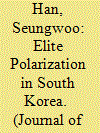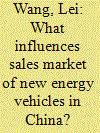| Srl | Item |
| 1 |
ID:
184757


|
|
|
|
|
| Summary/Abstract |
This study analyzes political polarization among the South Korean elite by examining 17 years’ worth of subcommittee meeting minutes from the South Korean National Assembly's standing committees. Its analysis applies various natural language processing techniques and the bidirectional encoder representations from the transformers model to measure and analyze polarization in the language used during these meetings. Its findings indicate that the degree of political polarization increased and decreased at various times over the study period but has risen sharply since the second half of 2016 and remained high throughout 2020. This result suggests that partisan political gaps between members of the South Korean National Assembly increase substantially.
|
|
|
|
|
|
|
|
|
|
|
|
|
|
|
|
| 2 |
ID:
171577


|
|
|
| 3 |
ID:
149911


|
|
|
|
|
| Summary/Abstract |
We use biofuel patents as a proxy for biofuel innovation. Through use of natural language processing and machine-learning algorithms, we expand patent classification capabilities to better explain the history of biofuels innovation. Results indicate that after the initial establishment of the U.S. biofuel industry, there were two surges in biofuel innovation: 1995–2000, characterized by heavy patenting by 1st generation (food-based) biofuel firms; and 2005–2010, characterized by a second surge of innovation by those same large firms, complemented by a large number of biotechnology firms producing a relatively small number of 2nd generation biofuel patents. Our analysis corroborates the widespread understanding that the first surge in biofuel innovation was linked to innovations in agriculture, and that the second surge of biofuel innovation was driven by demand-pull policies mandating and incentivizing biofuels. But the slow emergence of a 2nd generation cellulose-based biofuels industry, far slower than called for by policy, suggests that technology-push policies more focused on R&D and investment may be needed to accelerate the commercialization of 2nd generation biofuels.
|
|
|
|
|
|
|
|
|
|
|
|
|
|
|
|
| 4 |
ID:
176807


|
|
|
|
|
| Summary/Abstract |
In recent years, new energy vehicles (NEVs), which are considered to be one of the most important ways of solving global warming and energy crisis, have seen rapid development. Owing to the far-reaching policy implemented by Chinese government, the sales volume (SV) of NEVs has seen an exponential growth, and China has become the world's largest consumer of NEVs. The objective of this study was to determine the focus of Chinese consumers with regard to NEVs and to understand how their interests influence the SV. We used data mining combined with deep-learning technologies to investigate a large number of purchase reasons and found that the primary motivating factors were the vehicle, demographic characteristics, and national policy. Additionally, to determine how these factors affect the market, we used correlation analysis to examine the relationship between the SV and the factors. The results indicated that national policies, infrastructure, demographic factors, and safety awareness are closely related to the SV. The findings of this study suggest valuable strategies for government departments, allowing them to publish relevant policies, and manufacturers, allowing them to target specific consumer groups. This approach addresses the environmental concerns by promoting the utilization of NEVs rather than traditional fuel vehicles.
|
|
|
|
|
|
|
|
|
|
|
|
|
|
|
|